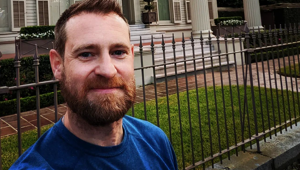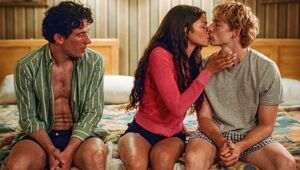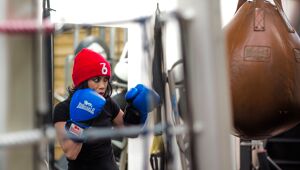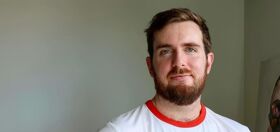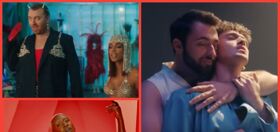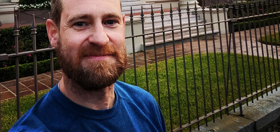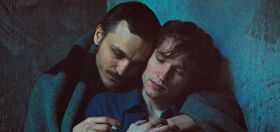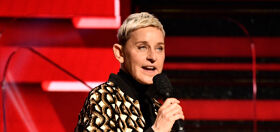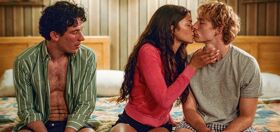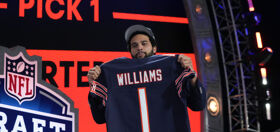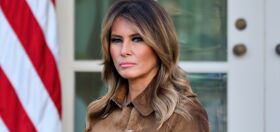
Few names tower over the American theatre like that of Betty Buckley.
The Texas born singer-actress, dubbed “The Voice of Brodaway” by New York magazine, has enjoyed one of the most acclaimed theatrical careers in history with roles in Sunset Blvd., 1776, Grey Gardens and most recently in the national tour of Hello Dolly! Buckley won a Tony Award in 1983 for her turn in Cats, originating the role of Grizabella in the original Broadway production. Theatre historians rank her alongside names like Ethel Merman, Mary Martin, Patti LuPone and Angela Lansbury as one of the greatest actresses in musical theatre.
Besides her theatrical work, Buckley has appeared in films like Carrie and Tender Mercies, and television series like Preacher and Eight is Enough. Hot off the success of Hello Dolly!, Buckley has announced dates for a cabaret concert series: October 17-19 at the Segerstrom Center in Costa Mesa, CA and November 2 at the Saban Theatre in Beverly Hills.
Queerty scored some time with the Broadway great to chat about her new cabaret show, her work as an actress, and the perils of life upon the wicked stage.
How about we take this to the next level?
Our newsletter is like a refreshing cocktail (or mocktail) of LGBTQ+ entertainment and pop culture, served up with a side of eye-candy.
You don’t stop. You just finished a huge tour in Hello Dolly. Now you’re doing another cabaret tour.
Well, it’s just a few concerts at the Segerstrom Center in Costa Mesa, and then at the Saban Theatre in LA. That’s a big concert. Tom Scott, the brilliant saxophone player is opening the evening with a wonderful singer named Billy Valentine. I do the second half, and Tom’s going to be my guest, and Billy Valentine will hopefully come back to do a song with me. I’m working with my incredible band led by Christian Jacobs for both concerts. He’s been my musical director, arranger, and pianist for 10 years. We’ve done three albums together.
Oh wonderful.
He’s an amazing guy who composed the scores of two of Clint Eastwood’s films.
Oh wow.
He’s been nominated for seven Grammys, so I’m a very lucky girl with all the talented people I get to work with. I’m a huge Tom Scott fan; I’m thrilled to work with him in the concert as well.
So why concerts?
I haven’t actually done concerts for a year and a half because I did Preacher for several months in New Orleans, right before I went to New York to rehearse Hello Dolly! and then was on the road for 13 months. So I took a month off and basically just started back to work on the concerts a couple weeks ago. I had some concert stuff that was scheduled for September moved to 2020 because I knew that I would need some recovery time.
It’s good to hear you rest.
Oh yeah. That tour took it out of me. I’m still recovering from that. It was an amazing gift of an experience, and a delight. I’m so grateful to Scott Rudin & Jerry Zaks for calling me to do the show. It was a remarkable experience, but I’m glad to be home and back to work on music.
How does your approach to performing in cabaret differ from theatre?
Well, with a theatre piece like Hello Dolly! you’re surrounded by a remarkable set of artistic collaborators doing the costumes and the sets and the choreography and the direction, and it’s a whole story. Whereas my concert work—it’s like presenting an evening of short stories.
Ooh, I like that.
Doing a musical is like being one part of a novel.

Sure. Does your approach to a song differ if you’re in a full production versus a concert?
Yeah, in that it’s my band. Like, we’re doing three Hello Dolly! songs as part of the show with brand new arrangements by Christian and me. I guess the difference is when I inherit a show of the classic proportions of Hello Dolly! for my sojourn in it for those 13 months, I’m bound to the circumstances and the production. There’s very little I can do to alter the course of that other than to bring my interpretation to the material which, fortunately, Jerry Zaks really encouraged me to do. But still, those arrangements, those orchestrations are a given set of circumstances. With an evening of short stories organized by me and my collaborators, it’s my vision in association with my musicians. I’ve always thought of doing concert work as a little gallery showing of the most recent paintings I’ve done.
That’s interesting.
Yeah. I’ve always seen music in terms of paintings. In fact, I request that my arrangers—I’m very specific about the story and the setting and the character, and I describe all that in visual story terms to my musician collaborators. I’m with them in creating a painting of that moment in time. Some are large pieces and some are smaller in proportion, but there’s always a character at the center of it in a specific environment in a specific situation. The music is organized to help tell the story I’m bound and determined to tell with material that resonates with me in that particular moment in time.
Sure. I love that metaphor. So they tell me you’re not delving into your Broadway songbook for this concert series; rather you’ll be doing some of your tracks from your albums Hope and Story Songs, which is exciting.
It’s going to be taken from two albums, Hope and Story Songs which is a two-CD set. The first CD was actually recorded at the Segerstrom Center. The second was recorded at Joe’s Pub; I kind of have a yearly residency there. I put these collections together every year. I call Christian, it usually takes about six months to organize and rehearse it all. I try it out, usually at Joe’s Pub, and if I think I have something good I call my friend Missy Calazzo. She and her husband head Palmetto Records. I say “I think I have a good thing here.” And she’ll say “ok.” And then they give me a budget and I go in with my brilliant engineers Jason Warmer and Reuben Cohen. They then take the live recording and mix it and make it sound better than it did.
[Laughter]
Then I send the final stuff to Missy and she puts it out there.
Awesome.
It’s pretty cool.
How do you know when a song is right for you?
I don’t know. It’s something like…
[A beat]
I came back from the Dolly tour and was just walking around my house and started singing a standard and was like that’s perfect. That’s where I’m at right now. So I emailed Christian and said “I want to do this standard. I want it to feel like this.” Then he sent some motifs as to what I described to him. Sometimes it’s immediate and I burst into tears and think it’s absolutely exquisite. Other times I’m like not quite what I had in mind. So it’s a collaborative effort.
Ok.
I went out to LA two weekends ago and rehearsed with him on six new pieces. Fortunately, our soul connection as musicians and as storytellers—he just gets it. I can speak to him as a storyteller because he knows how to set them up. He came up with these incredible ideas that just so joyous. They make me feel so happy. What’s great about being a concert artist is that I can bring my particular painting of the song to life. That’s a great joy to me.

I ask a lot of singer-actors this question. The singer-actress Alanis Morissette described acting as very masculine, but performing music as very feminine. Is that your experience?
I have no notion of that at all.
[Laughter]
I like Alanis Morissette though. She’s an incredible interpreter.
I think she describes inhabiting someone else as masculine, but portraying the emotion of a song as being feminine.
First of all—notions of being masculine or feminine, we could talk about that for hours. That’s a definition system. I firmly believe—and I’ve felt this since I was a child, which is why I was always so confused by the cultural standards for men and women. I could never really buy into them, that being a man and being a woman are so very different. I don’t think that’s true. I feel really confident that at the essential level, we are all souls. At the purist levels each of us calls ourselves “I Am.” That’s the identity of who we are. The rest is just definition systems that come from programming of our families and our educational system and our cultural morays that we grow up with. The majority of those are lies that we have to buy into to navigate our way through the world. You know, when I teach, I always say…did you ever see that movie Babe?
Oh sure. It’s wonderful.
Don’t you love it? The best movie ever. Remember the mice?
Yeah, they’re like a Greek chorus.
They sum up a chapter of the movie by saying “The way things are.” So I teach my students, you have to learn the way things are in order to navigate the minefield of our culture.
Sure.
There is truth, and then there is the way things are. And sometimes the truth and the way things are coincide, but most of the time, they don’t. I teach [my students] to meditate using a universal, spiritual philosophy so they can keep going back to essence and truth and remember the truth of who everybody else really is, even if other people don’t remember. You must never forget the essential truth and try to live your life from there. Does that make sense?
I think so.
So concepts of masculine/feminine—somebody figured that out along the line and said “This is who men are. This is who women are. This is what masculinity is, this is what femininity is.” But the truth is, that every single one of us are a combination of all of those elements. So I don’t think emotions belong just to a feminine experience. And certainly to me inhabiting a character is not masculine experience.

That’s wonderful. So when you do a concert series like this, or even when you’re on a big tour, how do you keep your voice in shape? What’s your regimen?
I have two voice lessons a week. I vocalize every day for about 30 minutes. I work out every day for an hour, if not more. I eat early enough so I won’t be burping through the show. I take a shower, get ready to go, and meditate anywhere from 20 minutes to an hour, depending on how my day has been organized. Then I go to work, do the make-up, get into costume and do a ritual of getting ready which also includes meditation.
That’s great. So I have to ask, the Cats movie is coming out this winter. Have you spoken to Jennifer Hudson about the role of Grizabella?
Oh no. I may have met her in passing, but we don’t really know each other.
What advice would you give her? What’s the key to that role?
No advice. She’s great. I love her, she’s amazing. She’s a great, great singer. Besides the promo for the movie, I saw her on YouTube singing “Memory” at some party or something. She sounded great.
Related: Faye Dunaway fired from Broadway-bound show for slapping crew
She has a Hell of a voice.
Stunning.
Ok then, what’s your next big role?
Well, we’ll see. If you’re a working actor, you’re always like what’s next? Fortunately, as soon as I was done with [Hello Dolly!] several offers came to me. It was very kind. I was honored, but I turned those down. I’ve not found the thing that feels exactly right. But that was good. It gave me a glimmer of hope.
Can I ask what they were?
I’ll say this: they were two movies for television and an independent film, and another film.

Do you have a dream role you haven’t played yet? Grizabella, Norma Desmond, Dolly Levi, Mama Rose…you’ve played about every great musical role out there.
Thank you. I wanted to be Annie Oakley [in Annie Get Your Gun] and I wanted to do it sort of as a stadium tour, producing a real Wild West show, but in the style of Cirque Du Solei.
Wow.
You know, finding the best horse and cowboy & Indian acts from around the world, to do that and have it be a centerpiece. Surrounding it would be Annie Get Your Gun. I conceived this of course, because I thought it was a brilliant way to bring my horses on tour with me.
[Laughter]
I imagined doing it in big coliseums all over the country, and maybe sitting down in Vegas or something. I pitched it when I was young enough to do the part to some big producers and nobody got my vision. At all.
[Laughter]
That’s been a lingering oh sh*t. I can’t be Annie anymore. But it would have been fun. I think I would have been an awesome Annie Oakley. You know, I’m a real cowgirl. I live on a ranch.
Sure. You’re a Texas girl.
And I ride cutting horses. I thought it would be fun. But that didn’t manifest. I don’t know. I’d love it if I could do some new piece with some really gorgeous music. I’ve been really lucky to work with M. Night Shyamalan on a couple of movies. I did Split two years ago that was such an international box office hit. And I got to work opposite James McAvoy. I love working with M. Night Shyamalan. I hope he calls me again.
Right on.
And Sam Catlin that was showrunner on Preacher—which was one of the greatest jobs I’ve ever had. That role was amazing: Madam Marie L’Angelle, one of the main villains of Season 3. I was a huge fan of the show prior to getting the call to do it. That was truly one of the greatest jobs I’ve ever had. Sam, besides being an incredible writer/producer is just a wonderful man. Everybody that worked on that project was amazing. That was a great job. So I’d love it if something like that would come along again with people like that. The joy of doing television, film, theatre, musical theatre is the people—the talented people you get to collaborate with. Musical theatre is one of the great art forms of pure collaboration. Behind every perfect moment, it probably took 200-something people to make it happen.

Wow. That’s awesome.
It is awesome. When it works, it’s amazing. And when you get to be the quarterback of the team, it’s pretty cool.
What would you say is your most underrated work?
I don’t really think in terms of that. What does “underrated” really mean anyway?
Well, maybe something you’re proud of that went overlooked, or wasn’t totally successful. I sort of hate to mention Carrie: The Musical…
Well Carrie wasn’t overlooked. It’s one of the most notorious musicals out there. I think that term is loosely used, and I don’t think it means much: “underrated.” I don’t do things and then think about my ratings, you know?
That’s probably healthy.
If I do something, it’s because I want to be involved with that team. So the thing itself is awesome to me, even with the challenges, even with some of the challenging people I’ve worked with from time to time. To me the whole joy of the business and get to work at all is collaboration. I love people. I love people and I love music. I love psychology and trying to figure out why people do what they do. I’ve been fascinated by that since I was a little kid. Being a student of psychology, to try and understand human beings. I find it fascinating. I think that interest coincides well with being an actress.
Totally.
I take all my scripts to my psychologist and collaborate with her. The quality of truth I want to be part of in the world, at a time when I think it’s so difficult right now. I think it’s important for those of us that care to try and put statements of beauty and truth and joy out into the world and make accurate statements, not nihilistic statements. We have to counteract this odd force of things going on that’s so destructive.
Are you looking ahead? Who do you like in 2020?
Well obviously I’m a Democrat, and I care deeply about all that. So whoever rises to the surface that cares deeply about all that too I will support. Anything, anyone that can be the leader to take us away from all this.
Betty Buckley will perform her concert at the Segerstrom Center for the Arts in Costa Mesa, CA October 17, 18, and 19. She’ll also perform at the Saban Theatre in Beverly Hills November 2.


